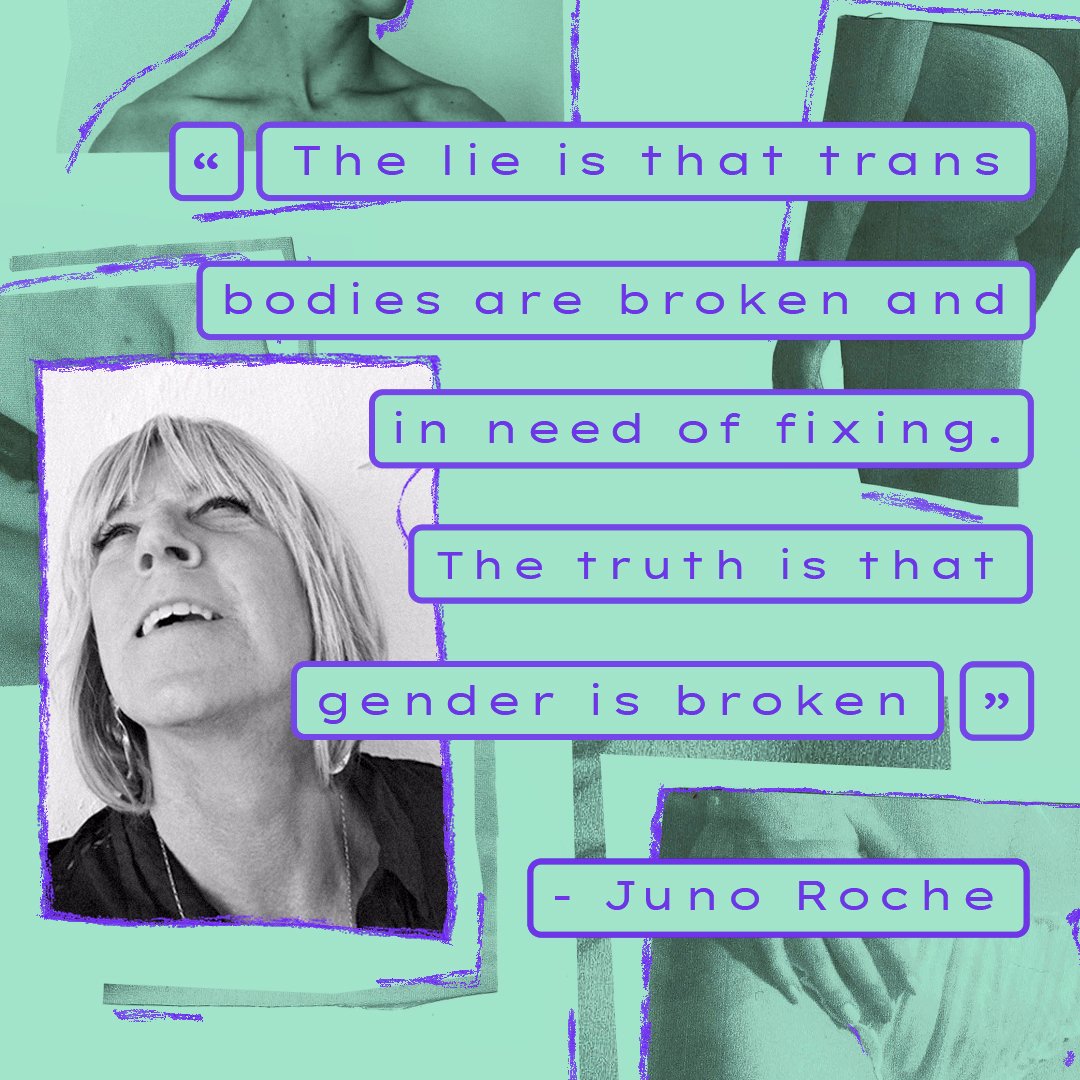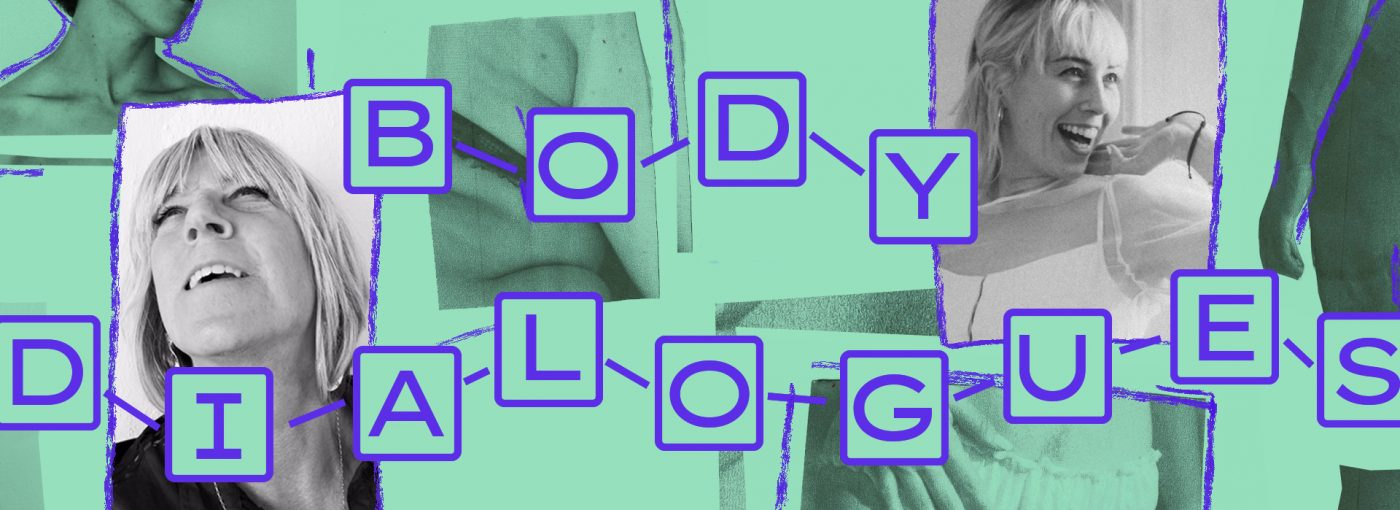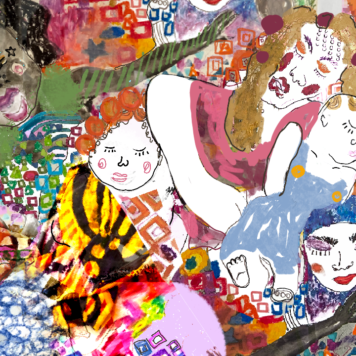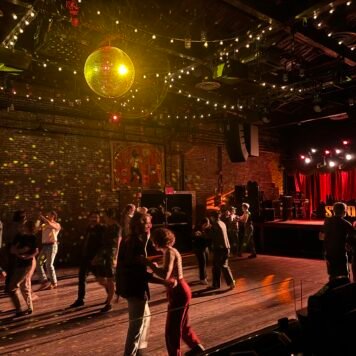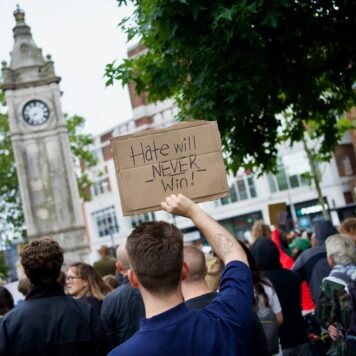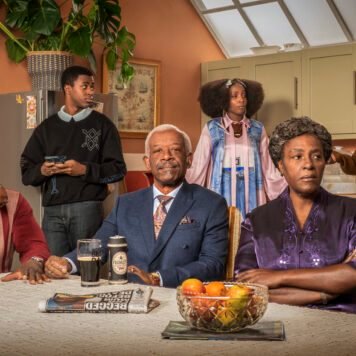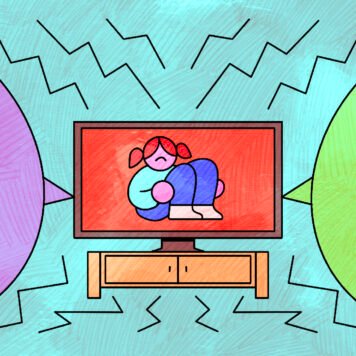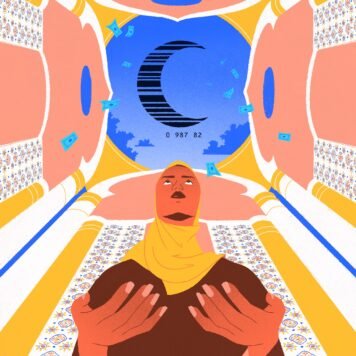In this interview series, I will be speaking with creatives, educators, activists, writers, and healers, to uncover the body’s intelligence. In embarking on my own journey of mental health and sexual wellbeing, a common theme kept coming up, and it was this idea of coming back to the body. On the simplest level, we starve ourselves from the wisdom of our body, and perhaps tapping into this, we can return to wholeness.
[Trigger Warning: Mention of suicide]
Trans rights in the UK have been popularly debated since the so-called “Trans Tipping Point” of 2014 – an optimistic term coined by Time Magazine, which also featured Laverne Cox on the front cover thanks to their role as Sophia in Orange is the New Black. This “tipping point” described the increased visibility of trans people in mainstream media and marked what it thought would be “America’s next civil rights frontier.”
But visibility does not always come hand in hand with progress or even acceptance.
Along with this increased visibility have come increased attacks from TERFS (Trans Exclusionary Radical Feminists), right-wing media, as well as notable authors and comedians who choose to dismiss, fear-monger, and mock the basic humanity of trans people.
Widespread negative messaging in the media has been found to negatively impact trans people’s mental health and increase their experiences of abuse. According to Vice World News, along with a rise in homophobia, there was a 332% rise of reported transphobic hate crimes between 2014 and 2021 in the UK.
By tearing down trans rights, TERFs are enforcing a gender based violence that feminism, as a concept, aims to eradicate. In the words of Black feminist scholar and activist bell hooks, white supremacy, capitalism and patriarchy areare “interlocking systems of domination that define our reality.” And these systems hurt everyone; enforced gender roles hurt everyone, particularly people who are intersectionally marginalised.
Through de-colonial, anti-racist, and queer movements, the inextricable link between colonialism and the gender binary is being increasingly recognised and resisted against. Pre-colonially, Indigenous cultures embraced gender fluidity, and today Hijra and Two-Spirit gender identities, among others, still endure.
Gender dysphoria
Gender dysphoria is described by the NHS as: “a sense of unease that a person may have because of a mismatch between their biological sex and their gender identity.” While writer Shon Faye explains in her book The Transgender Issue: An Argument for Justice that “dysphoria is not a precondition of being trans” and statistically only affects 0.4%of the population, the rise in non-binary identities might have something to do with a cultural awakening to the enforced gender restrictiveness.
“The liberation of trans people would improve the lives of everyone in our society,” she writes. But how do we get there? Faye believes that, “if we are to liberate all trans people socially, we must begin with the liberation of the physical trans body.”
In a world that seeks to erase and oppress trans people, author and activist Juno Roche offers a confronting perspective of dysphoria as a much wider issue. Reframing it as something that can affect all of us, and by addressing it as a social problem we can expand our capacity to experience more ease and pleasure within our bodies.
Setting the scene
Speaking with Juno was a no-brainer for me when deciding on who to interview for this series. I’d read their books Queer Sex and Trans Power, and was blown away by their authentic, energising and provocative writing style, as a trans working class person living with HIV. The interviews within each book offer broad yet intimate insight into what it really feels like to be a trans person, in a trans body, on a journey of trans pleasure.
There was something serendipitous about the timing of our interview. I received an invite to Pleasure and Efficacy: Feminism, Psychoanalysis, and Trans Embodiment by Critical Theory Professor, Grace Lavery. It was taking place the day before my call with Juno.
Having done my MA in Sexual Dissidence at Sussex University, I took the opportunity to make a wholesome trip out of visiting my old stomping ground in Brighton, collect a cast of my vulva and enjoy a delightful swim in the English Channel.
In Lavery’s talk, she recited an extract from her latest book Please Miss: A Heartbreaking Work of Staggering Penis. It was a wholly erotic scene involving finger limes, also known as the caviar lime, a small subtropical fruit containing little juicy orbs! On experiencing a moment of erectile dysfunction (which can occur when taking gender affirming hormones), this curious little fruit was a vessel for Grace to open up our sensual imagination to a world of sex beyond the body, beyond genitals, and beyond gender.
So, with the topic of trans expansive pleasure hot on my mind, the following day I was excited to get on the call. Following some technical difficulties, and a typical moan about the British weather, speaking with Juno was all at once stimulating, arousing and persuasive.
Our discussion asserted that dysphoria may not simply be just a transgender issue; that writing can be a tool for accessing comfort; and that spacious pleasure can arise from taking brave steps.
Dysphoria: “Gender is broken”
Juno removed themselves from a Tory-led Britain and now lives in what they describe as “mildly socialist” Spain. They say that life is much easier now. Yeah, no shit. But especially for trans people, life under the UK government is reaching excruciating levels, only made worse by the recent decision to not extend the Conversion Therapy (Prohibiton) Bill to protect trans people.
Under such oppressive systems, it’s no wonder the statistics for trans suicide is triggeringly high. According to Mermaids in 2017, it was found that 92% of trans youth have thought about taking their own life.
Instead of looking inwards, and at oppressive gender binary structures, the government has chosen to believe that these statistics point to a problem with trans people themselves. As Juno says: “they believe we have some kind of mental illness that needs to be dealt with, because we have this thing called dysphoria.” But as Juno pointedly asks, “who doesn’t?”
Subscribe to shado's weekly newsletter
Exclusive event news, job and creative opportunities, first access to tickets and – just in case you missed them – our picks of the week, from inside shado and out.

The lie, however, is that trans bodies are broken and in need of fixing. The truth is that, as Juno says: “gender is broken.”
“We have this notion that somehow gender gives life to bodies, but actually it breaks them. It breaks them because we’ve created such a repressive and punishing structure of gender,” they explain.
Juno offers a perspective that is at once confronting and totally liberating: that “dysphoria is something that’s applied to us from the get go. What trans people do is to navigate dysphoria openly.”
We live in a normatively white, ageist, ableist, racist, misogynistic, homophobic, transphobic world that makes it impossible for so many bodies to feel truly comfortable. “We have created these ideals to punish people with,” explains Juno. “It would be tough to be a body that doesn’t collide with that stuff occasionally.”
And that’s exactly what dysphoria is: discomfort – feeling uncomfortable in something you’ve been assigned. “And whether you fit into the binary at some point in your life or not, when you age, you will displease that binary,” explains Juno.
Dysphoria relates to everyone. Ageing, and the feeling of not being young anymore, is a lesser-named form of dysphoria. Juno points out that ”people will push the idea of botox, or some way of ‘holding on’ to your youth and desirability.”
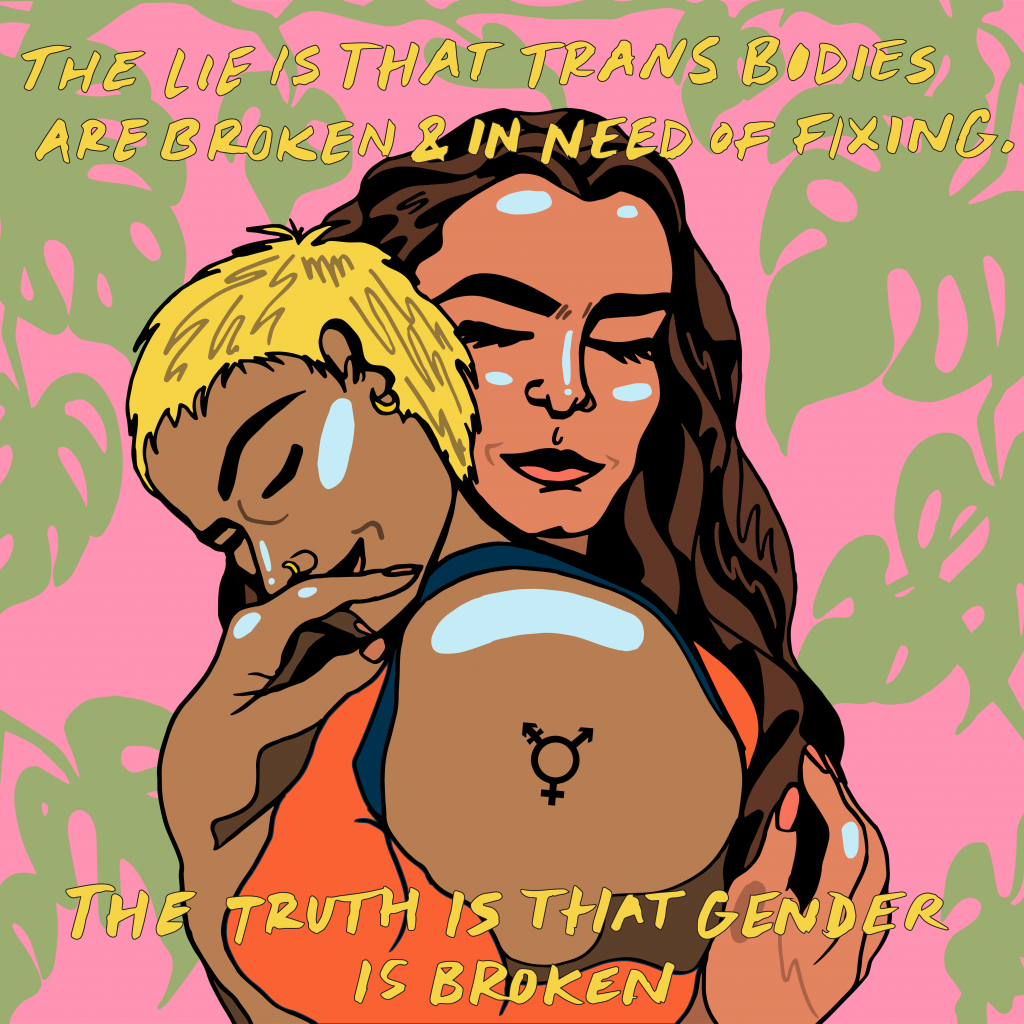
Liberation from the politics of the ‘ideal’ genitals
It’s not difficult to see why, then, so many people are getting hair transplants, breast augmentation, and even labiaplasty and penis enhancement surgeries to belong to these binary ideals. Genitals are gendered in such a way that to feel desirable, to feel fuckable, vulvas have to be ‘feminine’, ‘neat’ and ‘tight’, penises have to be ‘masculine’, ‘big’ and ‘strong.’
Juno tells me that when they were having their genital reconstruction surgery, their surgeon said: “I’m going to make you look as real as possible.” To which Juno retorts, “Based on what? Whose vagina are you modelling me on? Is it your girlfriend? Or your wife’s? Or someone you slept with when you were 17?” They continue: “when someone says to you ‘you’re going to look as real as possible’, there is this space between being and feeling, and that space can become dysphoric.”
After Juno’s “neo-vagina” was constructed, the surgeon praised it by saying it had “decent vaginal depth, more than adequate for penetration.” Which, thanks to society’s cis heternormative understanding of what sex is, assumes the sex will be penetrative and accommodating for a penis.
This really struck a chord with me. These incessant messages around what our genitals should look like, be like, and do, can be incredibly harmful to our sense of self-worth. That our bodies have to live up to certain gendered expectations of sexual performance to be deemed worthy of existing.
In 2019, I attended my first genital gazing workshop. Genital Self-Love Experience for female* identified/non-binary/trans*/intersex folk, held by Couples and Sex Therapist Helen Hagemeir.
Surrounded by an array of genitals, I held a mirror to my own and was faced with a surprising mixture of emotions – among them, I was surprised to find shame and embarrassment. Unsurprisingly, I wasn’t the only one. In the years from 2012 to 2017, it was found that the request for labiaplasty increased by 217.2%.
Nevertheless, this was possibly one of my most empowering turning points, as we gazed at our own and each other’s genitals, sending out loving intentions. I have since deepened a loving intimacy with my whole body and have come to realise that forming a connection with our genitals has a huge impact on our access to self-love and pleasure, as well as alleviating experiences of discomfort, and even pain. Recognising what our body needs in the moment and not ignoring it.
Unfortunately, the quest for attaining ‘perfect’ genitals (whether through labiaplasty, or genital reconstruction surgery), while it may relieve feelings of dysphoria, can potentially affect the experience of pleasure.
However, Juno explains that there are a number of trans people today who identify as trans but don’t have surgery, whereas previously, “to be considered trans you had to say that you wanted to be ‘just like’ cis people. This meant that even if you never were touched again, or you never had an orgasm – you were happy to have the surgery as you wouldn’t get beaten up. That was the deal.”
Writing into existence
Juno believes that writing creates a connection between comfort and creativity. “I write my body into existence. I write my sense of self into existence,” they explain. “I have actualised so much about my life through my writing. It’s the thing that enables me to understand the eroticness of my body, and accept that sexuality fluctuates and isn’t a fixed thing.”
This resonated, as I know that writing about bisexuality – whether it be in a scientific article or an erotic story – actualises it in a world that erases fluidity as it challenges the binary.
Admiring Juno’s deep wisdom, I learnt that their trans experience offers them an embodied lens through which they write, even to the point where they incorporate their genitals in the creative process.
“I write by looking down at my cunt, and my cunt looks back at me and says, ‘What today?’ – and that’s how I write. To a certain extent, it gives me such a kind of joy to do that, because I start writing from the point of view of having dived in between my legs and immersing myself. From that, I know what I need, and what feels right, and what doesn’t feel right.”
To Juno, having a trans body means that they can fully possess their body. “I own every last hair, every last follicle, every last cell”, they explain. “And it’s all mine to do with what I want to do with and being trans means I have decided to make some changes. I’m not interested in leaving a binary to go to a binary. I’m interested in my body occupying new ground, and it’s a trans body. Naked I’ve got a trans body. It’s neither one thing nor the other. And therefore, it’s neither. It occupies new ground.”
It’s this undeniable authenticity that seems to arise from a process of connecting with the body that fascinates me. There’s something about the body that doesn’t lie. If only we gave it the space to tell us what it needed to feel comfortable.
Being Trans and the younger community
While they believe writing can be a great way to navigate years of dysphoria, Juno is in awe of the younger generation who seem to have “just got it” when it comes to making gender work for them.
In their 2020 book Gender Explorers: Our Stories of Growing Up Trans and Changing the World, Juno spoke with young trans people to see what they made of it all.
“They’ve got everything that we’ve done over the last 50, 100, however many years in terms of transness, queerness, feminism, anti-racism. All of this has gone into these young people. They’ve got an elegance about gender, to the point where they just go, I don’t know about the word trans, I just made gender do what I need to do.”
I found myself crying at some of the stories in this book, simply for these young people’s defiance and strength in the face of a world of adversity. And this is the kind of pure comfort we all ought to be striving for.
What would come of it; in a world where we lived comfortably in our skin? It’s a utopian landscape that Juno believes is already being occupied.
“Queerness and transness are these two big landscapes that most people don’t want. And so they’re beautiful to inhabit because the people who do inhabit them, comfortably, are people that really enjoy space, and noise, and laughter, and fun, and creating new concepts around rules and new concepts around how we might live our lives.”
Stepping into pleasure
Juno is turned on specifically by trans bodies; “and bodies that aren’t seeking to emulate cis bodies. I’m interested in the shapes and the silhouettes that we form and our stitches and our scars.”
This comes after a long journey of self-acceptance. “My trans body is singularly beautiful. It doesn’t matter whatever age I am, what I weigh, how many wrinkles… I will get undressed in front of somebody, and I will celebrate in that moment.”
From writing their books, Juno was able to take steps towards their self-acceptance and self-pleasure. “I started to describe my genitals in their most absolute way. I say I have an ‘upcycled cock and balls’ that resembles a vagina. And it really does resemble a vagina and it is brilliant what they’ve done. But it’s all the old skin, it’s all the old stuff, nothing new is added.”
Juno remembers when they first said that, first wrote those words, it was a shock – but they then came to realise that it was true, and helped them feel more at one with their body.
After the initial loss of familiar pleasure that Juno experienced after surgery, they discovered new ways of experiencing pleasure. This is why trans-inclusive pleasure-based sex education is so important. With pioneers like Barbara Carrellas teaching us about the homogeneity of our genitals, and Tantric touch on gender-nonconforming bodies in her course Transcendent Bodies.
“Holding on to one idea of your sexuality and what can cause pleasure is really limiting,” Juno explains. “We’re really taught to feel shame about wanting to have pleasure. And it’s such an odd thing. Sometimes I’ll spend a whole day here, just gardening, or picking fruit, or in the summer laying naked under my olive tree in my courtyard, and just touching my body, and I put my legs really wide in the sun. And that’s my right.”
It is this complete dedication to pleasure that I’m left thinking about as we end our conversation. If more people learnt from the trans communities they’re attacking and let go of constricting binaries of gender and sex, we would all benefit and live in a more comfortable space. This can mean something different for everyone, I for one, plan to spend the afternoon comfortably writing something sensually erotic while I snack on some finger limes.
What can you do?
Read:
- Juno Roche:
- Grace Lavery, Please Miss: A Heartbreaking Work of Staggering Penis (2022)
- Shon Faye, The Transgender Issue: An Argument for Justice (2021)
- Lucie Fielding, Trans Sex: Clinical Approaches to Trans Sexualities and Erotic Embodiments (2021)
- Barbara Carrellas, Urban Tantra: Sacred Sex for the Twenty-First Century (2nd edition: 2018)
- Tomara Garrod, Here, Translucently, (2021)
- The Transgender Tipping Point, Time Magazine (2014)
Watch:
- Trans Liberation Will Liberate Everyone, Shon Faye, Channel 4 (2021)
- Disclosure, Netflix (2021)
- Transcendent Bodies, Barbara Carrellas (2020)
- IntraSensual Education, Tuck Malloy
Studies:
- The Transgender Tipping Point and trans representation in contemporary young adult (YA) fiction, by PhD student Jackson Jessie Nash (2019)
- Negative Transgender-Related Media Messages Are Associated with Adverse Mental Health Outcomes in a Multistate Study of Transgender Adults (2021)
- Mermaids Report (2021)
- Vice World News (2021)
